Contents
Plum Orlovskaya Dream is a winter-hardy and productive variety for the middle lane. It is valued for early ripening, high frost resistance and good taste of fruits.
History of variety breeding
The variety was obtained at VNIISPK, a state institution where breeding work is carried out. In 2009, the new hybrid was entered into the state register. The authors were E. N. Dzhigadlo, Yu. I. Khabarov, A. F. Kolesnikova, I. N. Ryapolova, A. A. Gulyaeva. The variety was obtained by pollinating seedlings of plum Alyonushka.
Description of the plum variety Orlovskaya dream
The tree is of medium size, reaches a height of 2,5 m. The crown is sprawling, raised, medium foliage, pyramidal in shape. The bark of the trunk is smooth, brown. Branches glabrous, brown-brown, straight.
The flowers are collected in inflorescences of 3 pcs. Corolla size 13 mm. Petals are white. The leaves are light green, smooth, with a pointed edge.
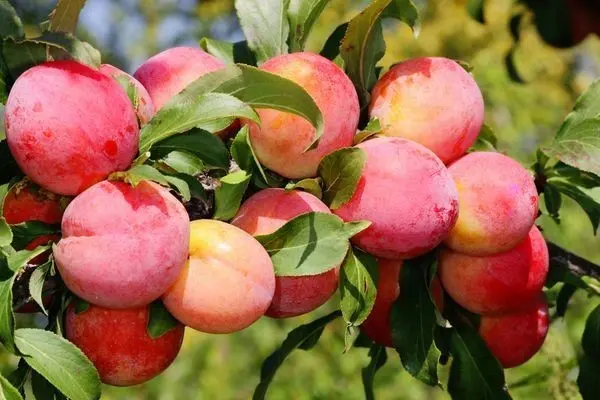
Characteristics of the fruits of the plum variety Orlovskaya dream:
- round shape;
- weight – 40 g;
- diameter – 41 mm, height – 44 mm;
- narrow deep funnel;
- Red color;
- numerous subcutaneous points;
- small wax coating;
- the pulp is juicy, fibrous, yellow;
- colorless juice;
- the stone is ovoid, hardly separated from the pulp.
Taste characteristics are estimated at 4,4 points. The fruits are easily removed from the stalk, do not crack when ripe. If the tree is overloaded, the plum will shrink. Dry matter content – 13%, sugars – 10,3%.
Characteristics of a variety
Chinese plum has a number of characteristics that are taken into account when choosing a particular variety. The culture is characterized by increased winter hardiness, early flowering, self-fertility and abundant fruiting.
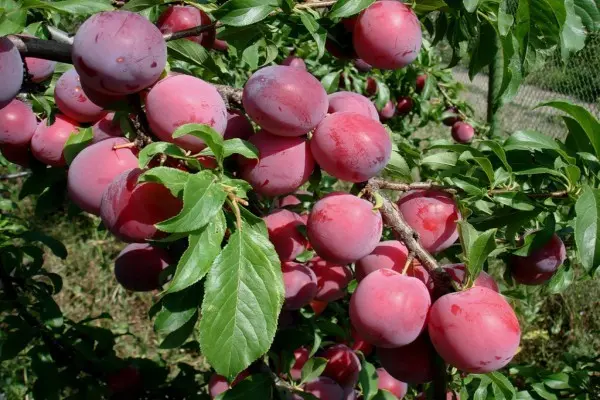
Drought resistance, frost resistance
The resistance of the variety Orlovskaya dream to drought is average. In the absence of moisture in hot weather, yields decrease and plum growth slows down. However, stagnant moisture in the soil is more detrimental to the crop.
The variety showed high frost resistance of both wood and fruit buds. Covering materials are used to protect against freezing.
Plum pollinators Orlovskaya mechta
The variety is partially self-fertile. The crop is formed without the participation of pollinators, however, planting them will help increase yields. Plum varieties that bloom at similar times are suitable as pollinators: Nezhenka, Nadezhda Primorye, Piramidalnaya, Alyonushka.
Plum blossoms in early terms: from the second decade of May. The fruits ripen in mid-August. Plums are formed on bouquet branches.
Yield and fruiting
Yield indicators are estimated as high. On average, 1 centners of fruits are harvested from 99,2 ha, the maximum figure is 119,8 ha. The start of fruiting falls on the 3rd year.
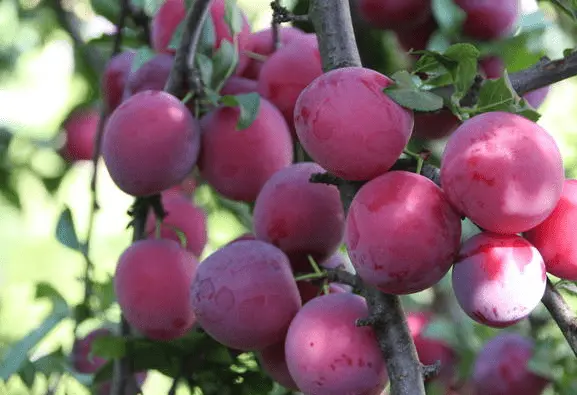
Scope of berries
Chinese plum is consumed fresh or used in home canning.
Disease and pest resistance
Plum Orlovskaya dream is not susceptible to clasterosporosis. So that the tree does not suffer from fungal infections and pests, agricultural practices are observed and preventive spraying is carried out.
Advantages and disadvantages of the variety
The main advantages of the variety:
- good yield;
- high winter hardiness;
- presentation and good taste.
Important disadvantages of the variety:
- partial self-fertility;
- under heavy load, the drain becomes smaller.
Features of landing
First, a seedling and a place for growing are chosen, after which a planting pit is prepared.
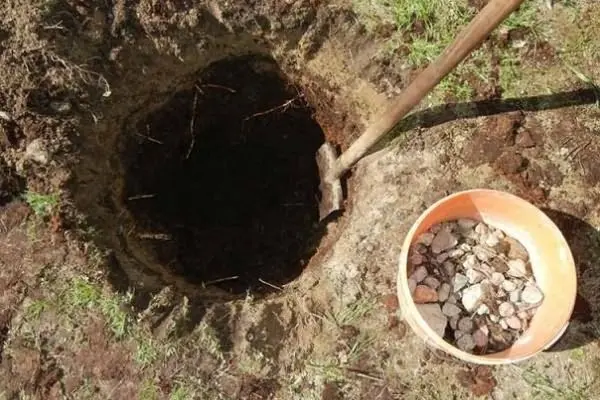
Recommended dates
In warm climates, Chinese plum is planted in the fall when the trees have shed their leaves. The seedling manages to take root and will be able to endure the winter. In regions with early frosts, work is left until spring. After the snow melts, you need to wait for the ground to warm up. Planting is carried out before the leaves bloom.
Choosing the right place
For Chinese plums, sites that meet a number of conditions are suitable:
- good lighting;
- flat terrain, hill or slight slope;
- lack of moisture stagnation;
- lightly drained soil.
Chinese plum prefers forest or chernozem soils. Sandstones and light loams are best suited for growing the Orlovskaya Dream plum. So that the tree does not suffer from moisture, it is not planted in the lowlands.
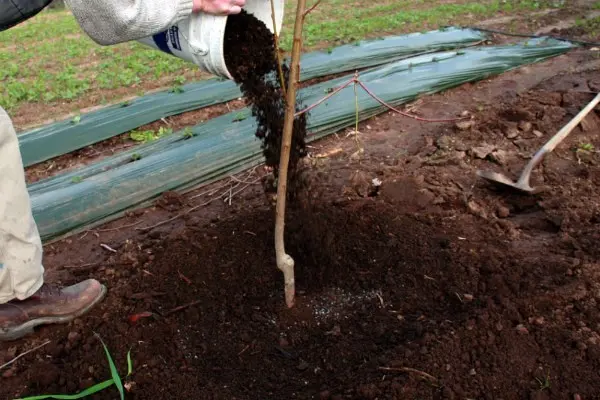
What crops can and cannot be planted nearby
Plums are best planted in groups of 2-3 varieties.
The culture is removed from apple, pear, birch and other large trees by 5 m or more. It is not recommended to plant plums next to raspberries and currants, however, proximity to other shrubs is allowed.
Selection and preparation of planting material
It is better to purchase seedlings of the Orlovskaya Dream variety in garden centers or nurseries. The plant is evaluated visually: it should not have rotten areas, cracks, broken shoots or other defects. If the roots of the tree are too dry, you can lower them for 3-4 hours in water before planting.
Landing algorithm

The order of planting Chinese plum Oryol dream:
- First, they dig a hole 60×60 cm in size and 80 cm deep.
- Fertile soil is mixed with compost in equal amounts. From fertilizers, 200 g of superphosphate and 60 g of potassium salt are added.
- The substrate is transferred to the pit and left to shrink.
- When the time is right for planting, a small hill is poured from fertile land. A plum is planted on top, its roots are straightened and covered with earth.
- The soil is compacted, and the seedling is watered abundantly.
Plum Aftercare
Fruiting largely depends on the care of the Oryol Dream plum.
The tree is watered 3-4 times per season: during flowering, fruiting and late autumn. 5 buckets of water are poured under young plantings, an adult tree needs 9 buckets.
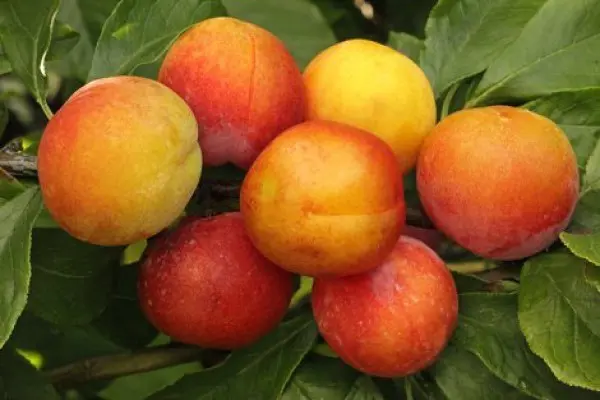
Full feeding of the Orlovsky variety begins 2 years after planting. Before that, the tree has enough fertilizer laid in the planting hole. Every 3-4 years, the site is dug up and fertilized with compost. In the spring, the plum is watered with slurry, in the summer a solution is prepared from 50 g of superphosphate and potassium salt per 10 liters of water.
By pruning form the crown of the tree. It is enough to cut the Chinese plum every 2-3 years. They leave annual shoots on which the crop ripens. Preventive pruning is carried out annually: frozen, broken and diseased branches are eliminated.
To protect the Orlovskaya Dream variety from freezing, winter watering is performed in late autumn. The trunk is spudded, compost is poured on top with a layer of 10 cm. Recently planted plants are covered with burlap, which is attached to the frame. The trunk of a tree often attracts mice and hares in winter, so it is protected with a casing made of tin or a metal pipe.

Diseases and pests, methods of control and prevention
Dangerous diseases of the culture are shown in the table:
Disease | Symptoms | Fight | Prevention |
Leaf niello | In early summer, a black coating appears on young leaves. | Spraying shoots with Bordeaux liquid or a solution of the Chorus preparation. | 1. Plum thickening control. 2. Preventive spraying with infusion of wood ash. 3. Cleaning up fallen leaves. |
destroyed | Dark, rapidly growing spots appear on fruits and leaves. | Plum treatment with Abiga-Peak. |
The table shows the most common crop pests and how to deal with them:
Pest | Evidence | Fight | Prevention |
Sawfly | The larvae eat the ovaries that fall from the tree. | Treatment with the drug “Fufanon” or “Karbofos”. | 1. Cleaning the trunk from moss and dead areas. 2. Treatment of plums with insecticides or tobacco dust. 3. Digging up the soil under the drain. 4. Cleaning leaves in the fall. |
Shield | The pest sticks to the branches and is covered with a shield. The affected plum is quickly depleted. | Spraying with a solution of the drug “Nitrofen”. |
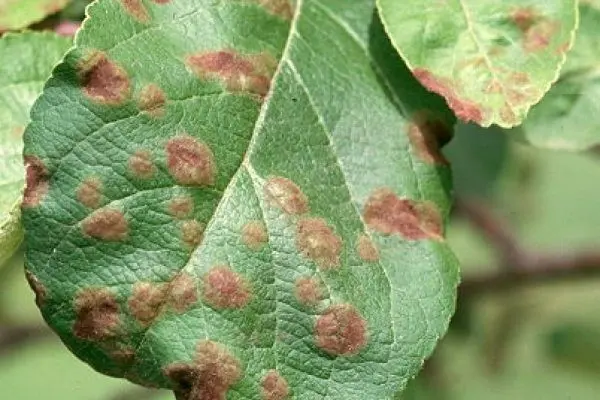
Conclusion
Plum Orlovskaya dream is designed for planting in the middle lane and colder regions. The variety is resistant to disease and frost, has a universal table purpose. The fruiting and growth of a tree depends on the choice of seedling and place for growing. After planting, plums provide constant care.
Reviews
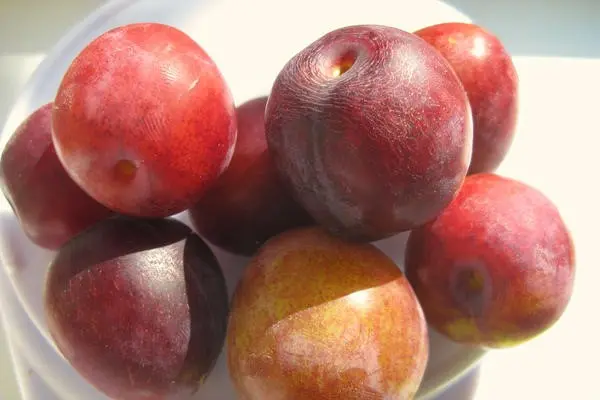
Video review of feeding plums, including the Oryol dream:









